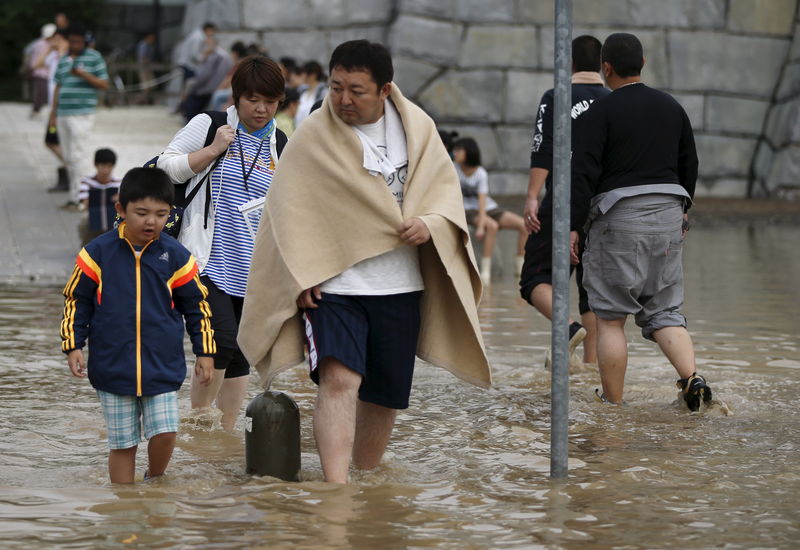By Issei Kato
JOSO, Japan (Reuters) - Floods that swept houses off foundations and crushed them under landslides spread across Japan on Friday as more rivers burst their banks, leaving at least 23 people missing and forcing more than 100,000 to flee.
A severe rain warning remained in effect for parts of northern Japan but floodwaters were slowly retreating in the worst-hit city of Joso after washing houses away, sometimes with their owners still inside, in scenes reminiscent of a tsunami.
Three people were killed, including a 63-year-old woman crushed when her house was hit by a landslide and another when her car was swept away. At least 28 people were injured, eight seriously.
Two eight-year-old children were among the missing as the flooding spread north to Miyagi prefecture, whose coastline was ravaged by the March 11, 2011, earthquake and tsunami that killed nearly 20,000.
Some of those rescued on Friday said the flooding brought back memories of that disaster.
"March 11 was the same. The people who didn't run saying that a tsunami would never come faced death," one man said.
"Of course, this situation is not as bad, but you have to be responsible for your own life."
The flooding did not reach nuclear reactors damaged in the 2011 disaster in Fukushima but at least 30 bags filled with suspected radioactive grass and other contaminated material were swept away from a site where they were being stored in a nearby town.
Most of the bags were recovered undamaged and none of the contents - which were from an area with low levels of radioactive contamination - had leaked, the Environment Ministry said.
Helicopters crisscrossed skies over the largely rural city of Osaki, 350 km (220 miles) north of Tokyo, where the brown waters of the Shibui river inundated rice fields and houses as rescuers in rubber boats ferried people to safety.
"My house is done for," one elderly woman told national broadcaster NHK.
Some parts of Japan received more than twice the usual September amount of rain in 48 hours by noon on Thursday, sparking some of the worst flooding in more than 60 years.
Japan has increased emphasis on disaster mitigation since the 2011 disaster and authorities are keen to avoid the kind of criticism leveled at governments in the past for what was seen as a sluggish response.

"We are doing everything in our power to rescue those in need as soon as possible," chief cabinet secretary Yoshihide Suga told a news conference.